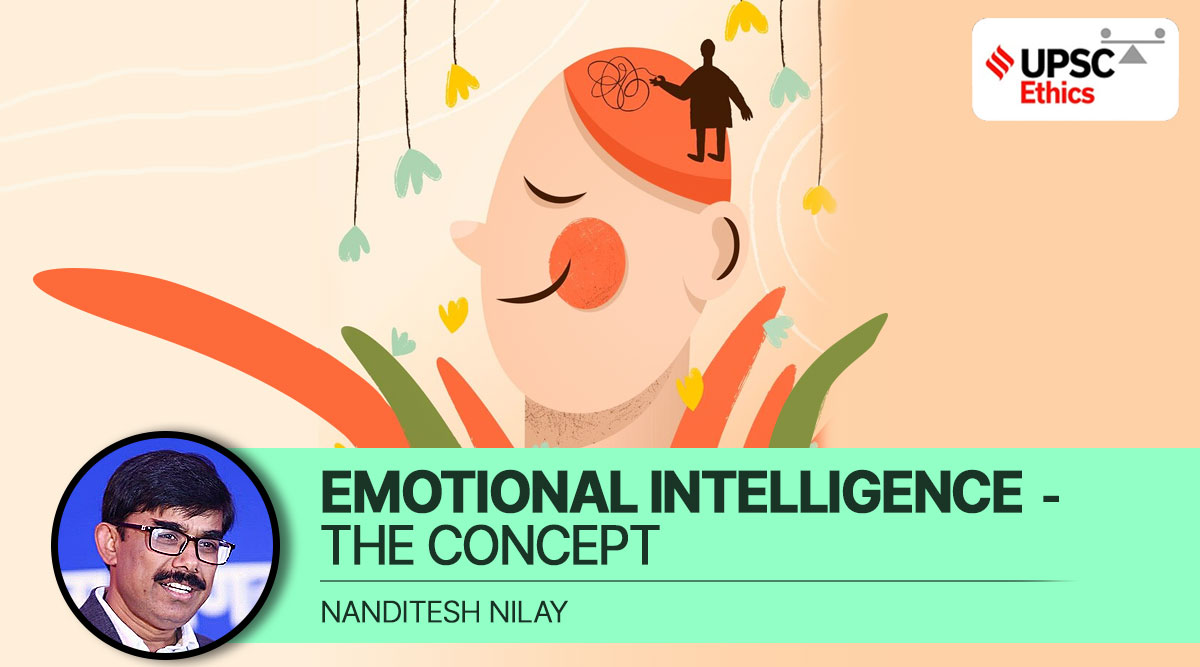UPSC Ethics Simplified | Emotional Intelligence: The Concept
What is Emotional Intelligence and are you an EI person? Nanditesh Nilay simplifies one of the most important topic of Ethics for your UPSC CSE.

Relevance: The topic is a part of UPSC CSE General Studies Paper-IV Ethics syllabus. Concepts are particularly relevant in the theory section. Aspirants will also find the article useful for their Essay paper and situation-based questions in personality tests. Moreover, the article’s essence will help aspirants professionally and in life.
Nanditesh Nilay writes for UPSC Ethics Simplified fortnightly. The first article will be a concept while the second article will be a caselet, based on the concept.
Are you an EI person?
This understanding is very important in today’s life. Most of the time, we interact, in a way, we have been doing for many years. Our reactions or our way of communication, a lot of times, forget to consider the other person in the cycle and we become habitual in giving importance to the “self” in the interaction only. As a public servant, every time in the field an officer will have to meet, interact and even decide in the middle of a plethora of things. Ultimately, man is a social being and cannot ignore the presence of so many factors in the social interaction process. Therefore, we need EQ or Emotional Intelligence.
What is Emotional Intelligence?
Emotional Intelligence is an ability that helps a person to recognise one’s own feelings or emotional pattern and simultaneously the feelings of others too. One learns to manage as well as understand it deeply for effective communication, decision making and minimising conflict in life. In other words, a high ‘Emotional Quotient’ (Keith Beasley used the term) person is a self-aware person. It is an ability which empowers a person to know oneself better, particularly one’s feelings, and become intelligent enough to receive others’ feelings too. But how to become an emotionally intelligent person? Here I would like to cite a recent example. A franchisee was seen busy in conversation with his team’s captain; however, visuals on the television screen were highly discouraging. And that shows how sincerely we need to learn the art of emotional intelligence. Period.
Emotional intelligence is a process that comprises of few steps and in 1995 science journalist Daniel Goleman in his book ‘Emotional Intelligence’ discussed those steps: self-awareness, self-management, motivation, empathy and social skills. And these steps help not only in managing or controlling one’s emotions for the self but for others too and are important for facilitating ethical conduct among human beings. In this context, the aspirant’s or any person’s understanding about emotional intelligence, its development and its role in ethical decision-making is being assessed, either in examination or in life.
What are the different parts of Emotional Intelligence?
To understand its framework one will have to divide emotional intelligence into three parts.
The first part of emotional intelligence focuses on understanding its concept in an elaborative way:
b) Understanding others’ emotions by being in their shoes.
c) Being able to control one’s emotions (like anger, jealousy etc.)
d) Thus, being able to manage one’s emotions and empathize with others.
e) Finally emerging as a motivating self.
The second part involves identifying methods of developing one’s emotional intelligence:
a) Behavioural
● Listening to others
● Taking feedback
● Not making hasty decisions
● Not going through frequent emotional ups and downs
● Open-mindedness
● Taking a positive view of the situation
● Removing biases
● Reading reaction pattern
b) Reflectional
● Introspection
● Reflective thinking
● Self-evaluation
● Focusing to evolve
The third part involves identifying the relationship between emotional intelligence and ethics.
a. Becoming aware of one’s emotions, the individual does not project one’s emotions on interpersonal relations and can assess the situation objectively.
b. Understanding others’ feelings helps the individual in getting into others’ shoes and being able to empathize with them.
c. Decision-making in an emotionally balanced environment is more logical and objective and not biased.
d. Being in control of one’s emotions also enables an individual to be more in tune with their own conscience.
e. It helps to grow rationally.
So ultimately these three parts expect a person to first know about emotional intelligence by working in the areas of self-awareness, self-management, motivation, empathy and social skills. Later one has to work on those behavioural as well as reflection methods to apply emotional intelligence effectively. And the third part is realising the impact of emotional intelligence and its relation to ethics. This in turn prepares a person to become more aware of the self and the environment and later take decisions ethically.
In the upcoming weeks, we will discuss those EQ steps more elaborately. And don’t forget. Leaders need a high EQ. To qualify for an exam, we need an IQ but to survive, perform and remain happy, apart from IQ, we will have to be high on EQ.
(The writer is the author of ‘Being Good and Aaiye, Insaan Banaen’ and ‘Ethikos: Stories Searching Happiness’. He teaches courses on and offers training in ethics, values and behaviour. He has been the expert/consultant to UPSC, SAARC countries, Civil services Academy, National Centre for Good Governance, Central Bureau of Investigation (CBI), Competition Commission of India (CCI), etc. He has PhD in two disciplines and has been a Doctoral Fellow in Gandhian Studies from ICSSR. His second PhD is from IIT Delhi on Ethical Decision Making among Indian Bureaucrats. He writes for the UPSC Ethics Simplified (Concepts and Caselets) fortnightly.)
https://www.youtube.com/watch?v=wsnxUastCeM?si=VlnO33b1m1UzShW4&w=560&h=315